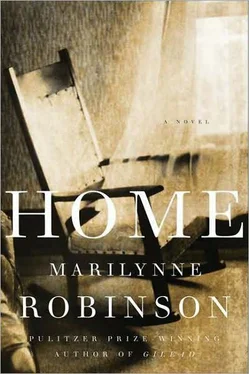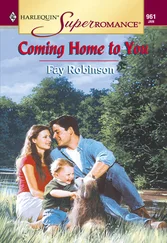He said, “Of course you will have to apologize.” He looked almost stern, only a little amused, only a little gratified. “You had better get it over with,” he said. As they knew, an apology freely offered would have much more effect than one that might seem coerced by the offended party, and since the neighbor was a short-tempered man, the balance of relative righteousness could easily tip against them. So the five of them walked by way of the roads to the other side of the block. Somewhere along the way Jack caught up and walked along with them, as if penance must always include him.
They knocked at the door of the small brown house and the wife opened it. She seemed happy enough to see them, and not at all surprised. She asked them in, mentioning with a kind of regret the smell of cooking cabbage. The house was sparsely furnished and crowded with books, magazines, and pamphlets, the arrangements having a provisional feeling though the couple had lived there for years. There were pictures pinned to the walls of bearded, unsmiling men and women with rumpled hair and rimless glasses.
Teddy said, “We’re here to apologize.”
She nodded. “You trampled the field. I know that. He knows, too. I’ll tell him you have come.” She spoke up the stairs, perhaps in a foreign language, listened for a minute to nothing audible, and came back to them. “To destroy is a great shame,” she said. “To destroy for no reason.”
Teddy said, “That is our field. I mean, my father does own it.”
“Poor child!” she said. “You know no better than this, to speak of owning land when no use is made of it. Owning land just to keep it from others. That is all you learn from your father the priest! Mine, mine, mine! While he earns his money from the ignorance of the people!” She waved a slender arm and a small fist. “Telling his foolish lies again and again while everywhere the poor suffer!”
They had never heard anyone speak this way before, certainly not to them or about them. She stared at them to drive her point home. There was convincing rage and righteousness in her eyes, watery blue as they were, and Jack laughed.
“Oh yes,” she said, “I know who you are. The boy thief, the boy drunkard! While your father tells the people how to live! He deserves you!” Then, “Why so quiet? You have never heard the truth before?”
Daniel, the oldest of them, said, “You shouldn’t talk that way. If you were a man, I’d probably have to hit you.”
“Hah! Yes, you good Christians, you come into my house to threaten violence! I will report you to the sheriff. There is a little justice, even in America!” She waved her fist again.
Jack laughed. He said, “It’s all right. Let’s go home.”
And she said, “Yes, listen to your brother. He knows about the sheriff!”
So they trooped out the door, which was slammed after them, and filed home in the evening light absorbing what they had heard. They agreed that the woman was crazy and her husband, too. Still, vengefulness stirred in them, and there was talk of breaking windows, letting air out of tires. Digging a pit so large and well concealed that the neighbor and his tractor would both fall in. And there would be spiders at the bottom, and snakes. And when he yelled for help they would lower a ladder with the rungs sawed through so that they would break under his weight. Ah, the terrible glee among the younger ones, while the older ones absorbed the fact that they had heard their family insulted and had done nothing about it.
They walked into their own kitchen, and there were their mother and father, waiting to hear their report. They told them that they didn’t speak to the man, but the woman had yelled at them and had called their father a priest.
“Well,” their mother said, “I hope you were polite.”
They shrugged and looked at each other. Gracie said, “We just sort of stood there.”
Jack said, “She was really mean. She even said you deserved me.”
Her father’s eyes stung. He said, “Did she say that? Well now, that was kind of her. I will be sure to thank her. I hope I do deserve you, Jack. All of you, of course.” That tireless tenderness of his, and Jack’s unreadable quiet in the face of it.
Mr. Trotsky planted potatoes and squash the next year, corn the year after that. A nephew of the rural cousin came to help him with his crop, and in time was given the use of the field and built a small house on one corner of it and brought a wife there, and they had children. More beds of marigolds, another flapping clothesline, another roof pitched under heaven to shelter human hope and frailty. The Boughtons tacitly ceded all claim.
WITHIN WEEKS OF HER RETURN GLORY AND HER FATHER had settled into a tolerable life of its kind. The housekeeper, Mrs. Blank, who was a number of years older than her father, was happy to retire, now that she knew she was leaving the Reverend in good hands. Customary attentions to her father by neighbors and parishioners were bated, stealthy when they happened at all. Glory could feel how miraculous and temporary the cessation was. It was as if some signal had been given, as if a sea had parted and the waters were standing back like walls. Once when they were children her sister Grace, pondering at the dinner table, said she did not know how such a thing could have happened, that water could simply stand still like that, and Glory, who had turned this question over in her mind, said it would have been like aspic. She had not meant to explain the miracle, only to describe its effect. But everyone at the table laughed at her. Jack, too. She had sometimes felt he took more pity on her youth than the others did. So she noticed and remembered that he laughed. All the same, it had seemed to her, laugh as they might, that sticking a finger into a wall of stopped water could not differ essentially from sticking it into a molded salad — which she had occasion to do, being a minister’s daughter, any number of times. She was caught at it more than once. But she thought it was inevitable that out of all those multitudes one Israelite or Egyptian must have made the same experiment, and that touching a fish in those circumstances could not differ greatly from touching a slice of banana. What a strange thing to remember. It came with being home.
Every day she swept and straightened — light work, since the house was virtually uninhabited. She did what little her father required to make him comfortable. He sat at the window, he sat in the porch, he ate crackers and drank milk and studied the newspaper and The Saturday Evening Post . She read them, too, and whatever else she could find. Sometimes she listened to the radio, if there was an opera or a drama, or if she just wanted to hear a human voice. The big old radio grew warm and gave off an odor like rancid hair tonic. It reminded her of a nervous salesman. And it made a sullen hiss and sputter if she moved away from it. It was the kind of bad companion loneliness makes welcome. A lesson in the success of clumsy courtship, the tenacity of bad marriage. She blamed and forgave it for its obsession with “The Flight of the Bumblebee” and Ravel’s “Boléro.” To appease the radio she sat beside it while she read. She even thought of taking up needlework. She might try knitting again, bigger, simpler things. Her first attempts were a baby sweater and bonnet. Nothing had come of that. It had alarmed her mother, though. She said, “Glory, you take things too much to heart.” That was what they always said about her. Hope was serene, Luke was generous, Teddy was brilliant, Jack was Jack, Grace was musical, and Glory took everything to heart. She wished they had told her how to do otherwise, what else she should have done.
She wept easily. This did not mean that she felt things more deeply than others did. It certainly did not mean that she was fragile or sentimental or ready to bring that sodden leverage to bear on the slights that came with being the baby of the family. When she was four she had wept for three days over the death of a dog in a radio play. Every time she teared up a little, her brothers and sisters remembered how she had sobbed over Heidi and Bambi and the Babes in the Woods. Which they read to her dozens of times. As if there were any other point to those stories after all but to elicit childish grief. It really was irritating, and there was nothing to be done about it. She had learned to compose her face, so that from a distance she would not necessarily seem to be weeping, and then they made a little game of catching her at it — tears, they would say. Ah, tears. She thought how considerate it would have been of nature to allow the venting of feeling through the palm of a hand or even the sole of a foot.
Читать дальше












